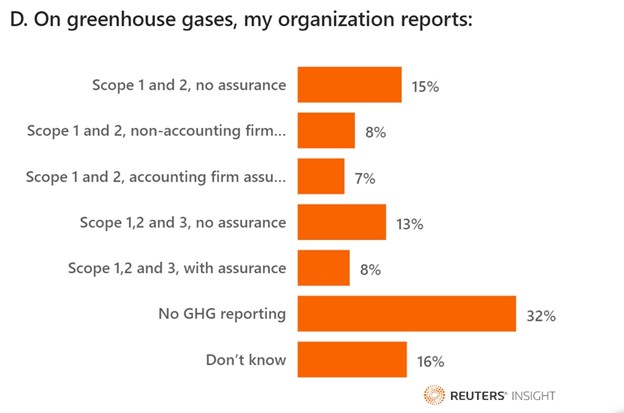The SEC's proposed rules on companies' climate-related disclosures are going to be finalized soon, and companies should start preparing now
The U.S. Securities and Exchange Commission’s (SEC’s) climate-related disclosures proposal is expected to be finalized later this month. The proposal has received both backing and criticism since the rules were put out for public comment in March 2022.
The potential mandate of Scope 3 disclosures, which includes reporting of carbon emissions of external suppliers, and the short time frame to comply could leave many companies underprepared. With the rules likely to commence in either late-2023 or 2024, companies have little time to waste in preparing themselves.
Important parts of the proposed SEC rules include:
-
-
- The reporting scope and subsequent timeline is broken down into four categories: Large accelerated filers, accelerated filers, non-accelerated filers, and small reporting companies, the latter of which need to engage fully with Scope 1 and 2 reporting but not Scope 3.
- Depending on where they land in the above-mentioned categories, companies will begin reporting from between 2023 through 2025, based on the SEC’s current proposed rules. Most critically, companies must ensure that their entire value chain is engaged to meet the demands of Scope 3 reporting.
- International companies will be subject to the proposal, and foreign private issuers also will be subject to almost the exact same rulings.
-
The urgency for companies to prepare is increasing
The tight window for companies to start reporting their Scope 1, 2, and 3 carbon emissions is creating an urgent need for public companies to take action, in particular for large accelerated filers, but many still are waiting. Indeed, many U.S. firms do not currently report on their greenhouse gas (GHG) emissions and only a small minority report on Scope 3 emissions, according to Reuters Insight data, which notes that only 30% of U.S. organizations are reporting Scope 1 and 2 emissions.
Even more worrying is that only 21% of U.S. organizations are reporting Scope 3 emissions. Overall, 32% of U.S. organizations currently have no GHG reporting at all, and another 16% don’t know if they report on GHG emissions, as of the time of Reuters’ survey conducted between August and October 2022.
Greenhouse gas reporting filtered by respondents from U.S. organizations

Understanding how the SEC’s rules apply is not straight forward — Deciphering the SEC’s climate proposal is the key needed action at present for public companies in order to give them the opportunity to prepare. Indeed, understanding the reporting scope under which your company falls is the first challenge to interpreting the appropriate timeline to follow for emission reporting.
With the reporting timeline potentially spanning from 2024 to 2027 and with a legal obligation to report, companies need to consider the full timeline and regulations with which they’ll have to comply under the SEC’s climate rules, once they are finalized.
The requirement for assurances adds to the need for action now — Additionally, this urgency is underscored because it takes time for companies to collect, aggregate, review, and report all of the emissions data across Scope 1, 2, and 3. In addition, large accelerated filers and accelerated filers are required to provide both limited and reasonable assurance — which often includes third-party verification — for the data, Specifically i) for large accelerated filers, limited assurance for the financial year 2024 to be filed in 2025, and reasonable assurance for the financial year 2026 to be filed in 2027; and ii) for accelerated filers, limited assurance for the financial year 2025 to be filed in 2026, and reasonable assurance for the financial year 2027 to be filed in 2028.
Scope 3 data is poor and the time to collect is insufficient — For organizations that are required to report Scope 3 data, a long lead time to collect and gather data is key. However, this data is usually poor. Of those U.S. companies that are already engage with Scope 3, most rate their Scope 3 data management negatively in terms of ease (63% of survey respondents say it is poor); effectiveness (62% poor); and efficiency (68% poor). This indicates that current practices for managing Scope 3 data require considerable improvements.
Advancing time for gaining approval for additional resources may be necessary — The primary cost expected from the SEC proposal are compliance costs. Companies may need to shift personnel and hire or retain additional staff to meet these demands. Data gathering, verification, and integration of new software will all also have to be considered by companies, along with outsourcing or partnering with third parties that can link internal upskilling with external support. The SEC estimates that the first-year cost of complying with the proposal will be $640,000 for companies not in the small reporting companies category.
Investors are driving the need for rules
The transparent disclosure of both aggregated and disaggregated GHG emissions will allow investors to access decision-useful information. This information can be broken down to allow them to identify risks posed by each unique greenhouse gas — for example, methane or carbon dioxide — while also showcasing total GHG emissions by either Scope 1, 2, or 3.
Using the full value chain of emissions also allows investors to make quantifiable voting decisions to aid their investment decision-making.







